Santee Coastal Reserve
Very nice
This camp site offers 7 sites with fire rings. There is no water or toilet facilities. Very nice ambiance and good hiking trails. Did not trip over any mosquitos.
Camping opportunities near McClellanville, South Carolina primarily center around the Francis Marion National Forest and surrounding waterways along the Atlantic coast. Buck Hall Recreation Area serves as a notable developed campground with RV hookups, tent sites, and access to the Intracoastal Waterway. The area also includes more primitive options like Santee Coastal Reserve, offering free camping in a wildlife management area, and Halfway Creek Primitive Camping for those seeking dispersed camping experiences. Most sites accommodate both tent and RV camping, with a few locations also offering cabin rentals.
Access to campgrounds varies seasonally, with high demand during shrimp baiting season (starting mid-September) and warmer months. Many sites require reservations, particularly at Buck Hall which fills quickly during peak periods. "We pulled in without reservations and nearly every site was booked out. The campground host was super helpful, though, finding us an empty spot due to a cancellation," noted one visitor about Buck Hall. Weather conditions significantly impact the camping experience, with humidity and insects being major considerations. Mosquitoes present a particular challenge at many sites, especially Santee Coastal Reserve where visitors regularly report intense mosquito activity during warmer months.
The region's campgrounds offer distinctive coastal experiences centered around waterways and maritime forests. Buck Hall Recreation Area provides direct views of the Intracoastal Waterway with opportunities for wildlife viewing, fishing, and boating. Several visitors mentioned frequent dolphin sightings from their campsites. Public lands throughout the area feature trails through maritime forests draped with Spanish moss and access to marshlands rich with wildlife. According to one camper at Santee Coastal Reserve, "There are several hiking trails around the reserve where you can see various birds and spot alligators bathing in the sun." Most primitive camping areas lack amenities but compensate with natural beauty and solitude. Proximity to the historic town of McClellanville provides access to seafood restaurants, with multiple reviewers recommending local establishments for authentic coastal cuisine.
$20 - $45 / night
"We pulled in without reservations and nearly every site was booked out."
"We had a blast kayaking around and had some awesome dolphin encounters. The historic town of McClellanville is super cute and I definitely recommend a seafood dinner at TW Graham's!"
"Santee Coastal Reserve is a hidden gem near the South Carolina coast offering eight, first come, first served primitive campsites in the Santee Coastal Reserve Wildlife Management Area."
"Gorgeous trails within walking distance. Great opportunity to see wildlife. Lots of mosquitoes, but not miserably so. Short drive to the beach."
"This primitive camping facility is located between McClellanville and Honey Hill. A short camp loop swings through an upland pine/oak forest and encircles a fire lookout tower."
"Small amount of road noise from nearby road but not objectionable. Nice large sites mostly shaded but i managed to find one that gets enough sun fir my solar panels."
"When I saw the sun rise, I popped out of Hamlet (our adventure rig) to take a look around. Wow…this remote dispersed campground was AWESOME!"
$68 - $300 / night
"There was a nice walking/biking path around the campground and downtown Charleston and Isle of Palms beaches were both close by. We are already planning a return trip."
"Lots of places close by to eat at but this feels so tucked away all at the same time."
"Its right on the trail, it also allows for you to drive right up to the campground and park your car, set up camp and then head out for a hike."
"Hiking trails are nice and groomed. Very peaceful and everyone stays to themselves."
"You drive in and there's multiple campsites for your tent, Car or RV. There's a large clean toilet cabin (not a basic privy).
It's next to a tall tower.
Fire area with picnic table."
$95 / night
"One of the cleanest campgrounds I’ve been to in South Carolina. And only a short walk from the beach"
"Huntington Beach State Park South Carolina. Stayed a week. Great campground. Trails, easy access to the most amazing beach. The nicest washroom facilities and laundry."
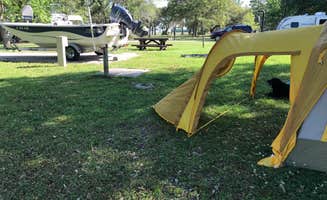
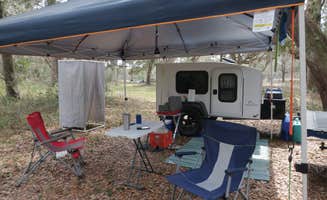
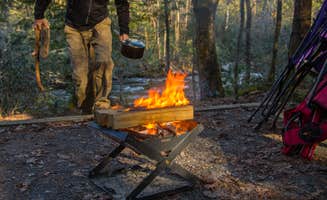
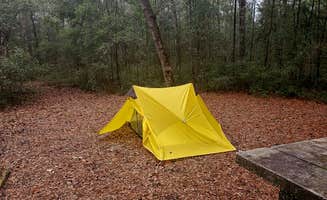
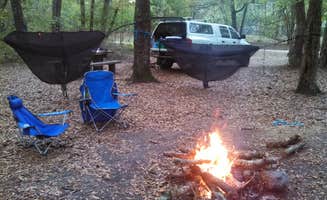
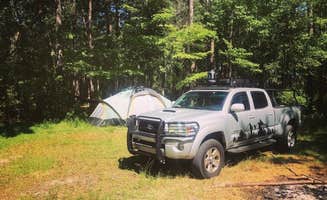
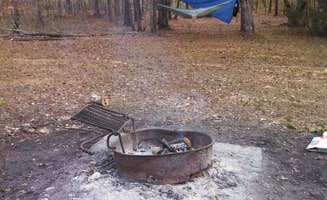
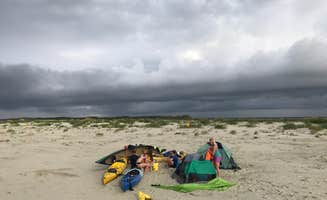
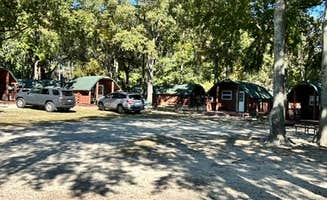
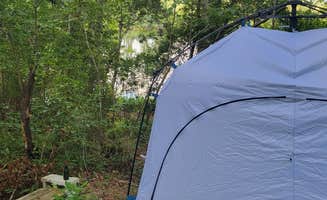
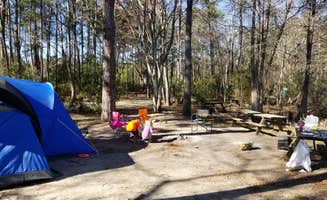
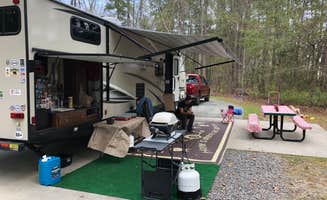
This camp site offers 7 sites with fire rings. There is no water or toilet facilities. Very nice ambiance and good hiking trails. Did not trip over any mosquitos.
Pulling into Charleston KOA just off US-17 south of historic Charleston immediately sets one at ease, with broad paved roads, clearly marked loops and a layout that feels intentionally family-friendly without being sprawling or overwhelming. This large KOA campground has a full suite of amenities that make it easy to feel at home, with clean bath/shower facilities, a heated pool, splash pad, playgrounds, dog parks, game areas and an inviting camp store, along with shaded sites, roomy pull-throughs for bigger rigs, and tent areas that are never too far from the action. One of our favorite parts of the stay was watching the boys splash and shriek with laughter at the pool one afternoon, then huddling around the community fire pit at dusk sharing s’mores and swapping stories with other families while an orchestra of cicadas serenaded us from the treetops. From what we saw, the best sites are the ones tucked toward the wooded perimeter, where you get more shade and a quieter feel while still being close enough to stroll back to the amenities without dragging gear for miles. We’d recommend Charleston KOA for families because of its EZ highway access, friendly atmosphere, and a variety of kid-centric amenities that help turn a simple overnight into a genuine camping getaway.
Tucked just off Jamison Road, just outside Summerville, Ladson RV Park feels more like pulling into a quiet residential pocket than a traditional campground, with a modest footprint, mature trees, and a low-key, no-frills atmosphere that prioritizes calm over commotion. The park is geared squarely toward RV travelers and longer-term stays, offering spacious, shaded sites (in some places, not all) with basic hookups, straightforward navigation and a noticeably slower pace than the busier parks closer to Charleston proper. One evening, the boys tossed a frisbee around the grassy edge of our site while dinner plans took us a short drive to Swig & Swine BBQ nearby, where we feasted on pork rinds and fried pickles while enjoying the family platter of pulled pork, smoked brisket, sausages and chicken wings - all of which disappeared fast and spirits stayed high before settling in for a quiet night. Back at Ladson's, from what we saw, choosing a site farther from the road offers the most peace and a little extra breathing room between neighbors. We would recommend Ladson RV Park for families looking for a practical, calm place to park overnight or short-term, especially if convenience to Charleston, shaded sites and a quieter suburban feel matter more than resort-style amenities.
We stayed 2 nights, used Lyft to go into town. About a $20.00 fair give or take a few dollars. Clean bathrooms, showers. Quiet park, we had a water, electric site. Two dump stations, laundry. Family owned and ran. Nothing fancy but great location for the price.
This was our first time staying here, and since it was the off-season, we enjoyed a peaceful visit. We stayed in the lovely area of the campground near Crater Lake, with a concrete pad, and the site was nicely level. Even some of the non-concrete spots looked very level. The staff was incredibly friendly and welcoming, making us feel right at home. The bathrooms were spotless, adding to our comfort. Exploring the grounds was a real pleasure, and we loved the easy access to the beach and all the attractions in Myrtle Beach. Plus, having a Walmart just across the street made everything so convenient. We're already excited about coming back!”,
$28 a night for Electricity; $18 for tent sites.
Mostly middle age & older campers; primarily boaters/fishermen as there is a boat ramp at this site.
Campground is a little run down but everything is clean & works ( except hand dryer in bathroom)
Hiking trail on site, opportunities for hiking, bird watching, boating /kayaking, & fishing on site.
Nearest gas station is 8 miles, Walmart/ FoodLion is 30, so bring the essentials.
My Verizon was 1-2 bars, enough for the basics. Starlink work great in 2 of the 3 sites I tried.
Camp Host was awesome and on top of everything.
Campground is peaceful and spacious!
Wooded, nice & quiet
Vault toilets were disgusting. 1-2 bars Verizon LTE (mostly one when it counted); no Starlink /satilite since it’s wooded. No nearby hiking trails, but dirt / gravel roads for cycling or OHVing
10 minutes to nearest gas station, 30 minutes to FoodLion / Walmart, so definitely bring what you need.
Each site has concrete table & fire ring, overflow tent camping, but no fire rings or tables
There’s a trailhead parking lot a little beyond the coordinates which you can’t overnight camp in your vehicle. However, there were tents in the trail a bit, so it might just be walk in tent specific, and not for vans? Still unsure.
Francis Marion National Forest offers numerous camping sites near McClellanville, South Carolina, with options ranging from established campgrounds to primitive sites. The region sits at nearly sea level with maritime forests and extensive wetlands. Camping areas experience high humidity year-round, with summer temperatures regularly exceeding 90°F and winter nighttime lows occasionally dropping below freezing.
Hiking trails through maritime ecosystem: Santee Coastal Reserve features multiple walking paths that showcase native wildlife. "There are several hiking trails around the reserve where you can see various birds and spot alligators bathing in the sun," notes a visitor to Santee Coastal Reserve.
Fishing opportunities: Buck Hall Recreation Area provides excellent access to fishing spots along the Intracoastal Waterway. "I've been to Buck Hall several times. Excellent place to trailer your boat, cook over a campfire, and have a shower to wash the salt off at the end of the day," reports one camper at Buck Hall Recreation Area.
Historical sites exploration: Within short driving distance from camping areas, visitors can explore regional historical landmarks. "The nearby Sewee Visitor Center has red wolves and is free to visit. They also have RV parking! We enjoyed this, but if you have kids I think it would be a must do!" recommends a visitor to Buck Hall Recreation Area.
Quiet, secluded atmosphere: Free camping at Santee Coastal Reserve offers peace away from crowds. "Small and quiet public campground. Large spaces with fire ring and picnic tables in most," writes one camper about their winter experience.
Wildlife viewing opportunities: The region provides excellent chances to see native animals. "We had a blast kayaking around and had some awesome dolphin encounters," shares a visitor to Buck Hall Recreation Area. Another camper at Elmwood Recreation Area noted the abundant wildlife, stating they enjoyed "cycling through the national forest, stopping at both the Hampton Plantation as well as St. James-Santee Church."
Access to waterways: Many campsites provide direct access to coastal waters. "Good for boating and fishing. Calm campground, with good ramp for boating and a pier for fishing," shares one visitor about Buck Hall Recreation Area.
Seasonal insect considerations: Mosquitoes and other insects can be extremely problematic, particularly in warmer months. "Bewares though, mosquitoes are in bazillions here and huge. Make sure you take your deterrent so they don't carry you off or take all your blood," warns a visitor to Santee Coastal Reserve.
Limited amenities at primitive sites: Many free camping areas lack basic facilities. At Halfway Creek Primitive Camping, "Everything here is pack in and pack out, so don't expect anything fancy, just a free and fun spot to camp for a night," explains a camper.
Variable site conditions: Weather and maintenance can affect campsite quality. "This primitive camping facility is located between McClellanville and Honey Hill. A short camp loop swings through an upland pine/oak forest and encircles a fire lookout tower," explains a visitor to Honey Hill Recreation Area.
Bring adequate water supplies: Many primitive camping sites lack potable water. "We drove the short distance to the Elmwood Recreation Area to fill our water jugs," notes a Santee Coastal Reserve visitor.
Consider day trips to Charleston: The historic city is accessible from most camping sites near McClellanville. "We spent three nights here as a base for our trips into Charleston. With our America the Beautiful senior pass, I think it was only like $50 for three nights," shares a visitor to Buck Hall Recreation Area.
Plan for wildlife education opportunities: Huntington Beach State Park offers excellent nature programs. "Do not miss saying hi to the wildlife on your way in. The egrets, herons, and gators are a beautiful sight heading to the camp sites and beaches," recommends one visitor.
Limited hookup availability: Most primitive sites near McClellanville lack RV hookups. "This is a primitive area along the Palmetto Trail in the Francis Marion National Forest. There are only a couple spots for an RV or Travel Trailer to park, but they are pull through along the side of the main loop," explains a camper at Halfway Creek Primitive Camping.
Consider Mount Pleasant-Charleston KOA for full amenities: For RVers wanting full hookups near McClellanville. "Located only 15 minutes from downtown Charleston and 10 minutes from Shem creek this campground is gorgeous and spacious. They offer kayak and bike rentals," notes one visitor.
Reserve sites early during peak periods: "We spent April 17-19 here. Beautiful spot on the intercostal waterway. Well maintained and lots of room between campsites," shares a Buck Hall Recreation Area visitor, though many note that during busy periods, especially shrimp baiting season, reservations are essential.
Frequently Asked Questions
What fishing opportunities are available while camping in McClellanville?
McClellanville offers outstanding fishing opportunities with access to both freshwater and saltwater species. Mr. Levy's Riceland Farm provides on-property fishing in a peaceful farm setting. For serious anglers, Blacks Camp and Restaurant in the Santee Cooper area has been a fishing destination for decades, offering full-service fishing and hunting experiences. The Intracoastal Waterway accessible from Buck Hall Recreation Area provides saltwater fishing opportunities, while Lake Marion and Lake Moultrie offer excellent freshwater fishing for bass, catfish, and crappie.
What are the best camping spots near McClellanville, SC?
The best camping near McClellanville includes Buck Hall Recreation Area, located along the Intracoastal Waterway in Francis Marion National Forest, about 40 minutes northeast of Charleston. Reservations during peak season are essential. Another excellent option is Santee Coastal Reserve, offering eight primitive campsites available on a first-come, first-served basis. The sites are spacious, accommodating multiple tents or RVs, though amenities are limited. For those seeking a more immersive forest experience, Elmwood Recreation Area provides remote dispersed camping in a natural setting.
What is the best time of year to camp in McClellanville, South Carolina?
The ideal camping season in McClellanville runs from late February through May and September through November. Huntington Beach State Park Campground visitors note that January can be too cold, with February or March offering more comfortable temperatures, though spring may bring more crowds. Summer (June-August) brings intense heat, humidity, and mosquitoes, making camping less comfortable, especially at sites like Honey Hill Recreation Area with limited shade. Fall offers pleasant temperatures and fewer insects, making it perfect for exploring the numerous trails and natural areas around McClellanville.
Are there RV-friendly campgrounds in McClellanville?
Foster Creek RV Park and Villas provides RV sites near Charleston, though be aware the sites lack shade trees and you'll need to back in as there are no pull-through sites. For a more amenity-rich experience, Campground at James Island County Park offers excellent facilities close to Charleston. While not directly in McClellanville, Johnston Landing Campground & Cabins on Lake Moultrie provides waterfront RV camping. Most RV-friendly sites in the region require reservations, especially during peak seasons.
Keep Exploring